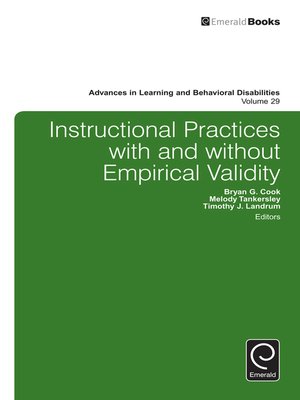Advances in Learning and Behavioral Disabilities, Volume 29
ebook ∣ Instructional Practices with and without Empirical Validity · Advances in Learning and Behavioral Disabilities
By Bryan G. Cook

Sign up to save your library
With an OverDrive account, you can save your favorite libraries for at-a-glance information about availability. Find out more about OverDrive accounts.
Find this title in Libby, the library reading app by OverDrive.



Search for a digital library with this title
Title found at these libraries:
| Library Name | Distance |
|---|---|
| Loading... |
It is important that stakeholders are aware of practices supported as effective for students with learning and behavioral disabilities in order to provide instruction that results in improved learner outcomes. Perhaps equally important, stakeholders should also know which practices have been shown by research to be ineffective (e.g., have no, small, or inconsistent effects on learner outcomes). Special education has a long history of using practices that, though appealing in some ways, have little or no positive impact on learner outcomes. In order to bridge the gap between research and practice, educators must be aware of which practices work (and prioritize their use) and which do not (and avoid their use). In this volume, each chapter describes two practices one supported as effective by research and one shown by research to be ineffective in critical areas of education for students with learning and behavioral disabilities. Chapter authors will provide readers guidance in how to do this for each effective practices and provide concrete reasons to not do this for each ineffective practice.







